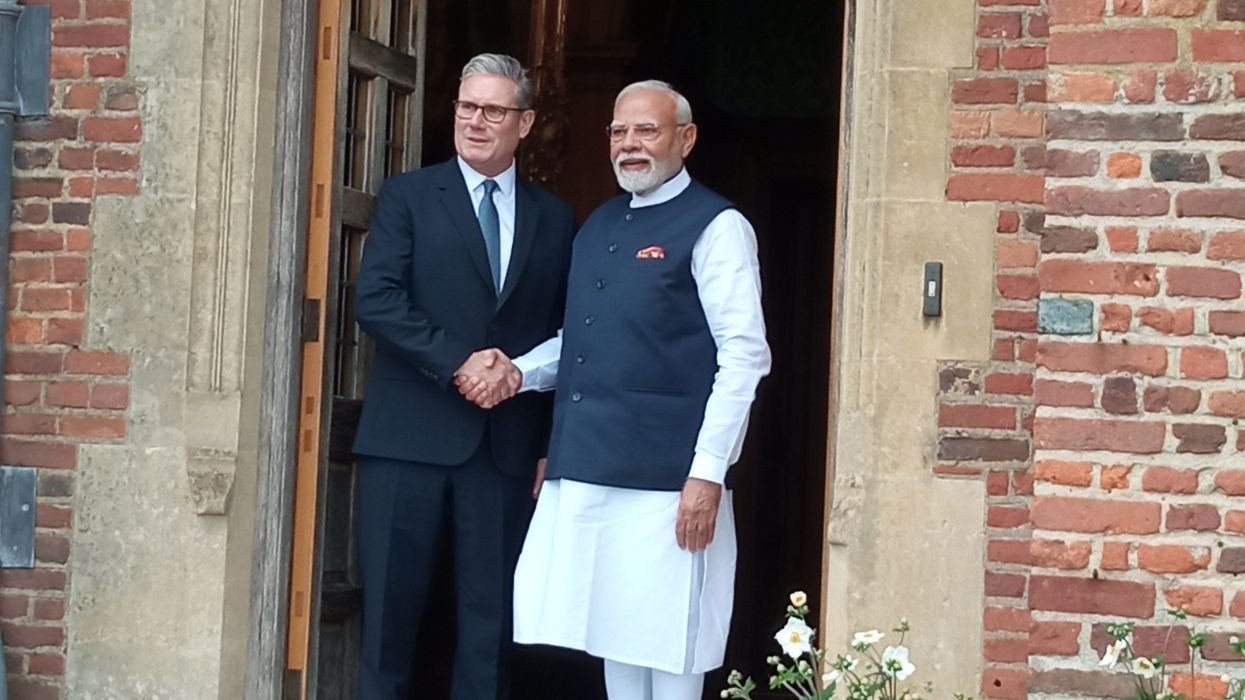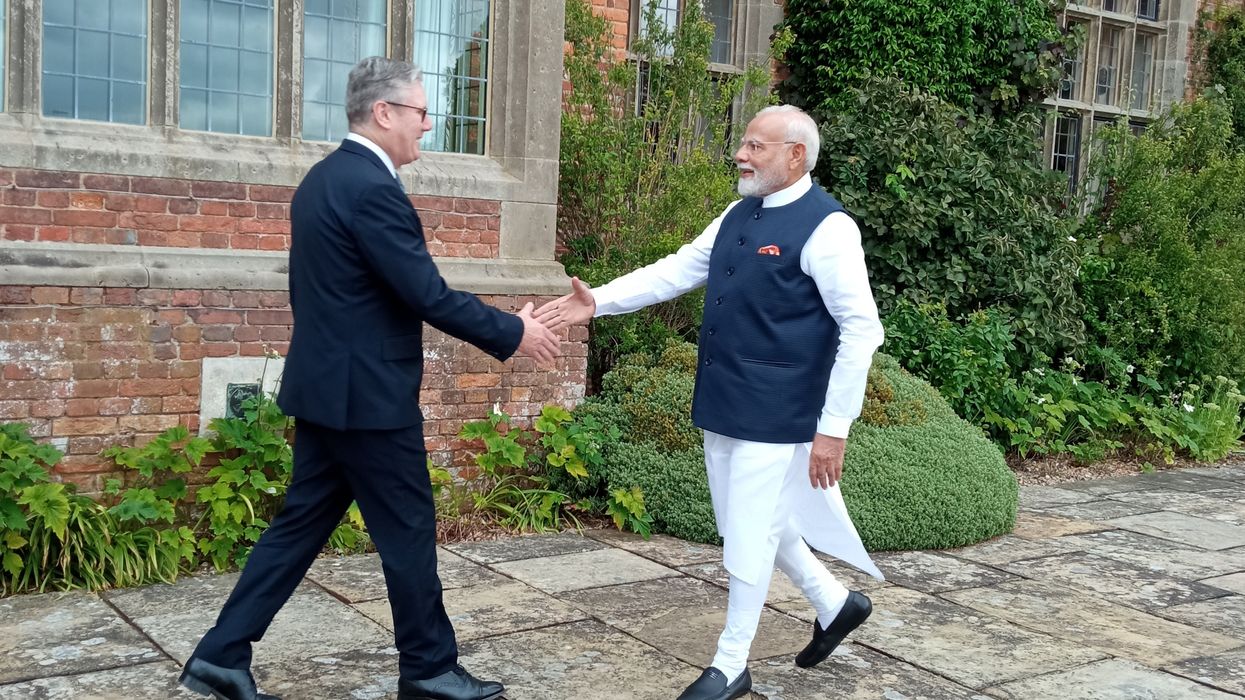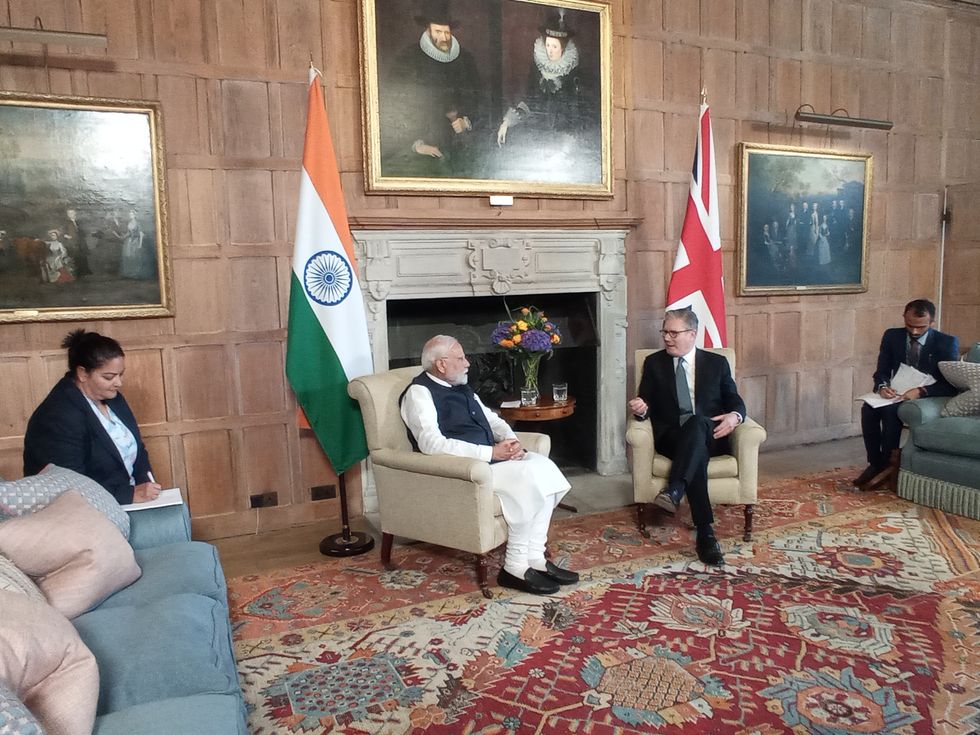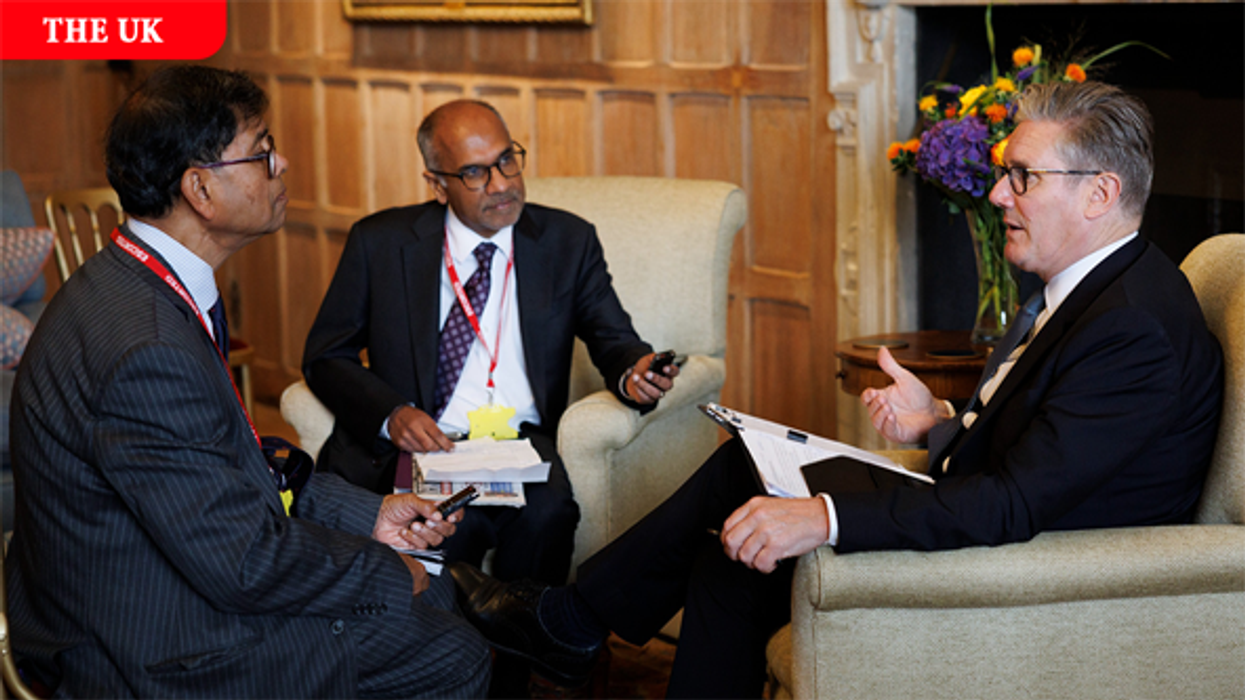PRIME MINISTER Sir Keir Starmer has promised to help British Asian businesses get the maximum benefit from the free trade agreement (FTA) he formally agreed with the visiting Indian prime minister Narendra Modi at Chequers on Thursday (24).
He made the pledge in an interview with Eastern Eye and Garavi Gujarat at the British prime minister’s country residence in Buckinghamshire.
He said: “I think for British Indian businesses, for British Asian businesses, this is the most significant deal since we left the EU. It is the best terms of any deal anyone’s ever had with India. And you heard the ambition from prime minister Modi that this is more than just a piece of paper.
“It’s a way our two countries need to work together. And there are some obviously impacted sectors, or enhanced sectors, whether that’s pharmaceuticals, whether that’s whisky, whether that’s manufacturing, but there are many other and there’ll be a real appetite now for increasing business.
“So it’s huge opportunity for businesses in the UK for dealing with and doing business with India. And I’m very much looking forward to taking this (further).”
- YouTube www.youtube.com
“I mean prime minister Modi and I sat down at the G20 last year, and had a discussion about our ambition for our business communities,” he went on, “and we both agreed that we wanted to take it to another level, and that’s what we’ve done today. So it’s a very good day for business. I wanted to make it easier for our businesses to do business, to trade, and that’s what we’ve delivered today. And I would simply say to them, ‘Take full advantage now of this deal, we will work with you. We will back you. We will make it as easy as possible for you to enhance your business opportunities. And there are going to be many coming out of this.’ ”
Starmer was asked about his remark in a speech on immigration that the UK risked becoming an “island of strangers”, for which he has since apologised.

He commented: “I mean, look, the British Asian community have brought huge amounts to this country and are a valuable part of this country. And I don’t just mean on business, I mean in culture, in terms of who we are as a country, and that is why we’ve always welcomed the community, rely on the community, and want to work with the community. In a sense, this deal is about enhancing the opportunities of British Asian businesses as much as anything else. So, we thank them for their incredible contribution to being part of our society. And to be really clear, we are always welcoming of talent, of contribution into our society from around the world. That isn’t inconsistent with also saying we need to have proper control of our immigration framework. I think the two go together, but we’ve always been welcoming of our British Asian community, and quite right, too. And I think today, in a sense, is good evidence of how important that is to us as a country.”
He stressed: “Look, we’ve got a multicultural, diverse society, and it’s what makes us a great country. Always have been, always will be, and it is part of the very makeup of who we are, and that is both welcome and cherished by people across the country.”
The prime minister came across as relaxed and confident in his interview.

But he was pressed on how he would stem the exodus of wealthy entrepreneurs who had decamped to Dubai and other friendlier tax regimes because of harsh fiscal rules on inheritance and non-dom status imposed by the chancellor Rachel Reeves (she turned up at Chequers, incidentally, on Thursday).
“We want to attract and retain wealthy individuals and businesses in the United Kingdom,” Starmer insisted. “It is important that whatever system we have in place for tax is up to date, modern and fit for purpose now and in the future – and we had an out of date system. But I want to be really clear, we want to attract that talent. We want to retain the talent and the wealth that we have got. And I think the more we can do with our business communities, the more we can do with deals like the deal that we’ve done today, the better the environment we create for people to know that the UK is the place to be.
“And I would also say that we’re living in an unstable world now, whether that’s defence and security and conflict, whether it’s on the trade and economic side, where equally – it’s probably more and a more uncertain world than it's been for many years – the UK is becoming a real beacon of stability, a beacon of focus on growth and pragmatism.
- YouTube www.youtube.com
“And, of course, in 12 months, we’ve done three trade deals, which is evidence, I think, of the role the UK now has, and why it’s is a beacon for common sense and pragmatism: the India deal formally signed today; obviously, we’ve got a deal with the US; and a deal with the EU as well, which has got a number of strands sitting underneath it. And I think that is a very good news story for the United Kingdom after one year of this Labour government.”
Asked whether he saw a rising India playing a more prominent role on the world stage, he responded: “Yes, it is undoubtedly an emerging power, both in terms of economic power, but also global influence more generally. And I think there’s real significance in the words that both I and prime minister Modi said today, which was about seeing this as more than simply a trade deal, but it is a good trade deal on its own terms, but more as a statement of intent about how our two countries, fifth and sixth largest economies in the world, can work together.
“And that is about our values of democracy and freedom, deeply embedded values. And so today is very future looking in terms of the role of India. It is an emerging, increasingly powerful and important country in the world. And today is to be seen in that context, in my view. And I think it’s clear from the word used by both of us, that we both see it in that context, that in a more uncertain world, it is really important that key allies with long shared, rich histories, but also a real vision for the future, that ‘Vision 2035’ (which India and the UK have also agreed upon) is really important to both of us. So that’s a long way of saying yes.”
The Modi government felt comfortable dealing with the Tories during their 14 years in power. But the transition under Starmer has been much smoother than many expected, possibly because he has not allowed his Pakistani origin MPs to make Kashmir an issue, for example.

Starmer appeared to understand the point because he said: “I think what that shows is that the approach that I’ve taken, which is serious, pragmatic, respectful and focused on our national interest as the United Kingdom, but avoiding performative politics, avoiding rushing to the media every five minutes to complain about our allies, and actually just calmly working with leaders that I respect is a far better way of doing diplomacy than the rather noisy way in which some of my predecessors failed, frankly, in diplomacy, because these are examples.
“The India deal – for many, many years, successive governments, successive prime ministers, have been trying to get an India deal – by approaching it in a calm, serious, respectful way, we’ve managed to get that deal.
“And that’s because we created the conditions in which both countries could see it was to their advantage to have this deal at the moment, and it’s not in isolation. The same with the US. Again, there was an attempt to get a US deal for many years by my predecessors. And, of course, in best part of 10 years, we haven’t got as close in the relationship with the EU as we did in the EU-UK Summit. And I think that reflects a sort of quiet, serious, pragmatic diplomacy foregoing the theatrics, the performance and the constant running to the media of my predecessors.”
He agreed he had established a good personal rapport with Modi, though people are often reminded that Lord Palmerston, statesman and prime minister, told the Commons on 1 march 1948: “We have no eternal allies, and we have no perpetual enemies. Our interests are eternal and perpetual, and those interests it is our duty to follow.”
“Yes, very good, we get on very well,” said Starmer about his dealings with the Indian prime minister. “We’ve met each other a number of times. We’ve spoken a number of times, and I think and hope you can see there’s a mutual respect and warmth between us, and if anything, it would be nice to spend more time together. We had our tête-à-tête pencilled in for a period of time. We doubled that sitting in these two chairs, talking privately together. And I think you’ll be seeing more of that.”
At Chequers, Modi renewed his invitation to Starmer to visit India.




